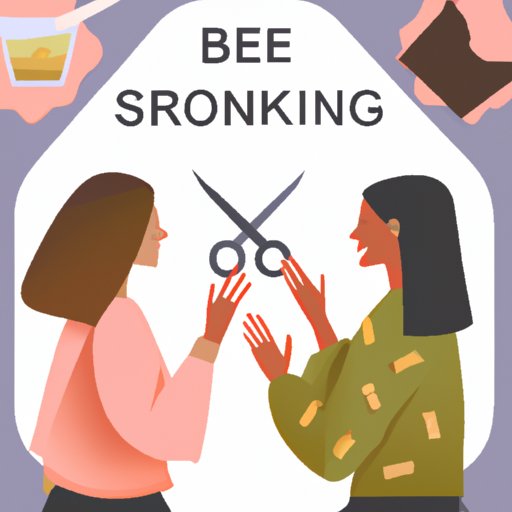Introduction
We all have relationships of varying levels of closeness and intimacy. Some of these relationships are healthy and supportive, while others can be draining and even damaging. Toxic friendships can be emotionally and mentally taxing and can even affect our physical health and well-being. Knowing how to cut off a toxic friend without being rude is an important skill that everyone should learn.
A toxic friendship is one in which one or both people behave in a way that is hurtful or damaging to the other person. This could include manipulation, criticism, verbal abuse, and other forms of emotional abuse. Toxic friends can also be overly clingy or possessive and might pressure their friends into doing things they don’t want to do. Whatever the case, it’s important to recognize when a friendship is becoming unhealthy and take steps to protect your own mental and emotional wellbeing.
According to a study by the American Psychological Association, “the presence of negative relationships is associated with lower psychological well-being and higher levels of depression.” It’s important to remember that it’s okay to distance yourself from someone who is not good for your mental health.
Setting Boundaries and Sticking to Them
The first step in cutting off a toxic friend is to set boundaries and stick to them. It’s important to identify when boundaries have been crossed and to create boundaries that you can enforce. Once you have identified what your boundaries are, it’s important to politely remind the person of them when they are crossed.
For example, if you don’t want to talk about certain topics, such as relationships or finances, tell your friend that those topics are off limits. If they continue to bring them up, you can calmly remind them that you don’t feel comfortable discussing those topics. It’s important to be firm but polite so that your friend knows that you mean business.
It’s also important to remember that your boundaries may change over time. As you get to know your friend better, you may find that your boundaries need to be adjusted. Don’t be afraid to communicate your needs and expectations to your friend.
Saying No
Sometimes, the best way to cut off a toxic friend is to simply say no. This can be difficult, especially if the person is used to getting their way. However, it’s important to stand your ground and politely decline their requests. It’s also important to be assertive and not let the person guilt you into doing something you don’t want to do.
If you find yourself in a situation where you need to say no, try to be direct and honest. You don’t need to give a lengthy explanation as to why you are declining the request. Simply say something like, “I’m sorry, but I can’t do that right now.” This lets the person know that you are serious and that your decision is final.
It’s also important to remember that there is nothing wrong with saying no. Saying no is a sign of strength and shows that you are in control of your life and your decisions. So don’t be afraid to say no when it is necessary.
Avoiding Gossip
When cutting off a toxic friend, it’s important to avoid gossiping about them. Gossiping about someone will only make the situation worse and can lead to further damage to the relationship. It’s also important to discourage others from gossiping about your toxic friend, as this can lead to more drama and hurt feelings.
If someone comes to you asking about your toxic friend, it’s best to take the high road and avoid talking about them. Instead, focus on the positive aspects of the relationship and emphasize how much you care about them. This will show your friend that you still care about them, even if you are distancing yourself from them.
Focusing on Yourself
When cutting off a toxic friend, it’s important to focus on yourself and prioritize your own needs and wants. This means setting goals and working towards achieving them. It also means taking time for yourself and engaging in activities that make you happy. Taking care of yourself is the best way to ensure that you are in a healthy state of mind and able to make sound decisions.
It’s also important to remember that you don’t have to do everything alone. Reach out to family and friends who can provide support and advice. These people can help you stay focused on your goals and provide a listening ear when you need it.
Finally, don’t forget to take time for yourself. Spend time doing things that make you happy and engage in activities that bring you joy. This could include reading, going for walks, listening to music, or spending time with loved ones. Doing things that make you happy can help reduce stress and improve your overall wellbeing.
Not Enabling Toxic Behavior
It’s important to understand what enabling behavior looks like and to avoid it at all costs. Enabling behavior is when you enable someone else’s bad behavior by making excuses for them or giving them what they want. This only reinforces their bad behavior and makes it harder for them to change.
Instead, it’s important to hold the person accountable for their actions. Let them know that their behavior is not acceptable and that you won’t tolerate it any longer. This will help them understand that their behavior has consequences and that they need to take responsibility for it.
It’s also important to remember that you can’t always fix someone else’s problems. While it’s natural to want to help someone in need, it’s important to recognize when it’s time to step back and let them work through their issues on their own.

Spending Time Doing Things You Enjoy
When cutting off a toxic friend, it’s important to spend time doing things that make you happy. This could include anything from reading books to playing sports to going for walks. Doing things that make you happy can help reduce stress and improve your overall wellbeing.
It’s also important to find activities that you can do alone. This can help you build confidence and independence and can be a great way to practice self-care. Additionally, it’s important to make time for activities that involve other people. Spending time with family and friends can be a great way to relieve stress and can help you feel connected to others.
Honest but Kind Communication
Finally, it’s important to communicate honestly but kindly with your toxic friend. This means being honest about your feelings and expectations and being clear about why you are distancing yourself from them. It’s also important to be kind and understanding, as this can help the person understand where you’re coming from.
It’s also important to remember that you don’t owe anyone an explanation. If you don’t feel comfortable sharing the details of your decision, then don’t. Just be honest and upfront about your feelings and let them know that you value your friendship but can no longer be in a toxic relationship.
Conclusion
Cutting off a toxic friend can be difficult, but it is often necessary for your own mental and emotional wellbeing. Setting boundaries, saying no, avoiding gossip, focusing on yourself, not enabling toxic behavior, spending time doing things you enjoy, and communicating honestly but kindly are all important strategies for cutting off a toxic friend without being rude.
Remember that it’s okay to distance yourself from someone who is not good for your mental health. Taking care of yourself is the best way to ensure that you are in a healthy state of mind and able to make sound decisions.
(Note: Is this article not meeting your expectations? Do you have knowledge or insights to share? Unlock new opportunities and expand your reach by joining our authors team. Click Registration to join us and share your expertise with our readers.)
